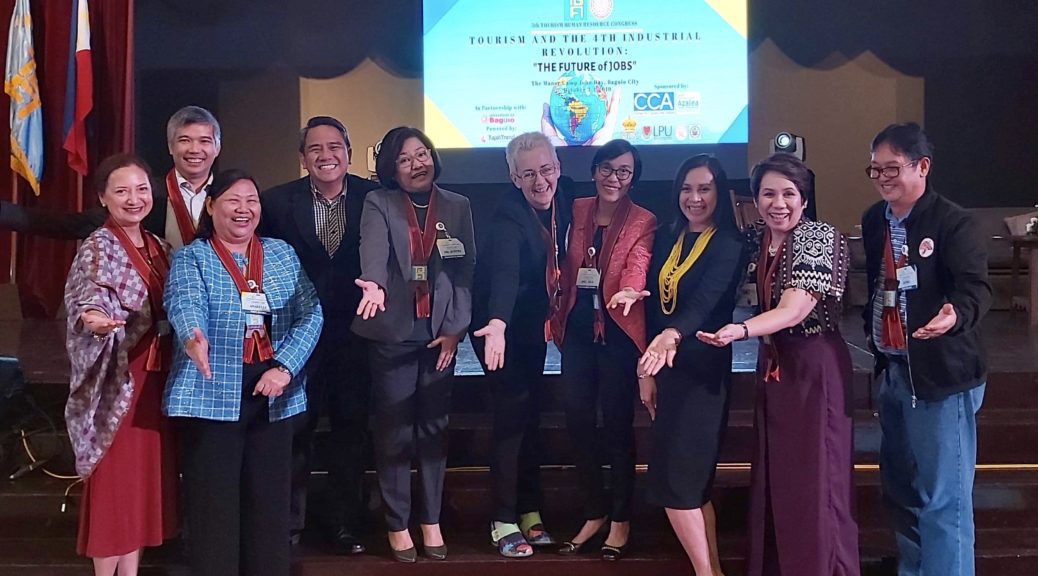(October 6, 2019, Baguio) When my friend Tinette Capistrano asked me to participate in the 5th Tourism Industry Board Foundation, Inc. (TIBFi) Human Resource Congress, I readily agreed, having been part of the first four summits. This biennial event brings together government, industry and academe to discuss how to make our human resources in hospitality and tourism globally competitive, a focus close to my heart.
The Forum, themed “Tourism and the 4th Industrial Revolution: The Future of Jobs,” took place October 3 and 4 at the Technohub in Camp John Hay, Baguio. The topic assigned to me was “Essential English Skills for Tourism Jobs in the 4th Industrial Revolution.” Aside from discussing how crucial English Language Skills are in Tourism, I also shared how our English Language Proficiency in the country has been declining over the years due in part to changes in the medium of instruction.
In 2016, Hopkins International Partners, where I serve as chairperson, released the Nation’s English Report Card. Hopkins International Partners is the official Educational Testing Service (ETS) preferred associate and exclusive representative for TOEIC, TOEFL ITP and TOEFL Jr. in the Philippines. This showed alarmingly that the average English Proficiency of Philippine college students was B1, which is lower than the target set for Thailand and Vietnam high school graduates. The results were based on a sample of 10,000 Filipino graduating college students who took the Test of English for International Communication or TOEIC. I dare say there were several in the audience who were surprised to learn the real state of our English proficiency.
To stop the decline, the Government Academe Industry Network (GAIN) is working on a number of initiatives, such as holding annual conferences focusing on the need to ensure that Filipino talent are equipped with 21st century skills; crafting a National English Roadmap together with the Commission on Higher Education; speaking at different fora to draw attention to the problem; and lobbying for the adoption of international standards in English Language Proficiency, as well as, a National English Act for Global Competitiveness of the Workforce. We are ecstatic that Sen. Pia Cayetano has filed Senate Bill #62: Providing for an Educational Roadmap Towards Global Competitiveness and Human Capital Development, and we hope that both the lower and the upper house will see this through into law so that the Philippines can retain the global advantage of our human resource.
At the Congress, I was fortunate to meet Ms. Maeve O’Brien who spoke on Training and Development of Human Capital for Future Tourism. I appreciate the efforts she has put into setting up a progressive tech-voc school in Laos that prepares students with hard and soft skills, including Tourism English, so that they can work in global tourism jobs and break free of poverty. Her subsequent proposal for more Public Private Partnership to create not-for-profit, revenue generating TVET in the Philippines is commendable.
The panel discussions were quite interesting, particularly the one where representatives from industry, academe, and labor discussed the importance of rationalizing On-the Job Training
and Teacher Immersion Programs for the Tourism Industry. Ably moderated by Dr. Christina Aquino, the panel was participated in by Mr. Hessel Larcia, president of the Peninsula Manila Labor Union; Mr. Ramon Cabrera, General Manager of The Manor at Camp John Hay; and Ms. Jenelyn M. Magpatoc, CGSP, MHRD, Dean, School of International Hospitality and Tourism Management of the University of Baguio. While there are many exemplary OJT programs being conducted by reputable institutions, I was aghast to learn that there are some programs that take advantage of the students to use them as profit generating labor rather than to actually impart knowledge to them.
Indeed, there is still much that we can do to prepare our Filipino talent for global tourism jobs, and I laud the TIBFI Board led by Dr. Christina Aquino as chairperson, and Ms. Anabelle Ochoa-Moreno as Congress Chair and TIBFI vice-chair, for organizing a successful and impactful HR congress to push this initiative forward. Congratulations!
